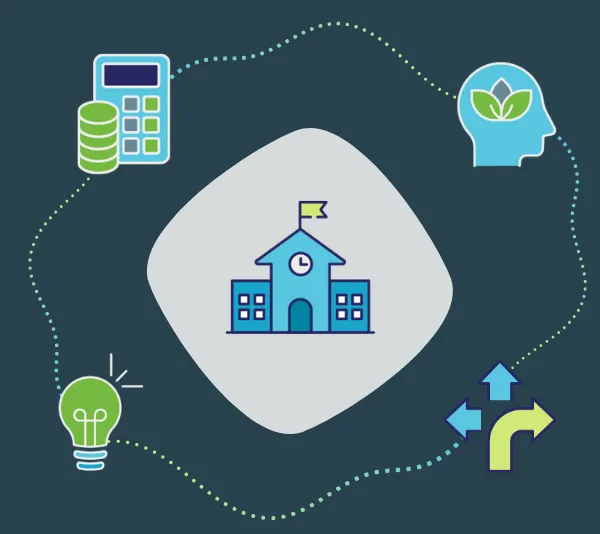6 Considerations for Whole Person Health for Students
It’s no surprise that determining and addressing factors that impact a person’s overall well-being are beneficial. In fact, several national initiatives are underway that promote whole person health, such as the Centers for Disease Control and Prevention’s Whole School, Whole Community, Whole Child Model and the U.S. Department of Health and Human Services’ Healthy People 2030.
Whole person health is a person-centered approach to enhance social, emotional, mental, and physical well-being through practices that maintain and restore health, develop resilience, and prevent diseases. While we all should embrace whole person health practices, it is especially important for youth because early health experiences set a foundation for how the body reacts to biological and environmental influences like nutrient uptake, illnesses, and stress, according to researchers.
Health-promoting behaviors targeted in health education standards, like the National Health Education Standards, include eating a healthy diet, exercising, learning how to manage stress, getting quality sleep, and maintaining a healthy social life in a safe and nurturing environment. Below are considerations for encouraging these health-promoting behaviors.
Eat a Healthy Diet
A healthy diet is inclusive of vegetables, fruits, whole grains, legumes and beans, lean protein from animal sources, and water. There are several ways that children can be encouraged to maintain a healthy diet such as eating breakfast daily to reduce urges to eat unhealthy foods later in the day and providing snacks like dried fruit and low-fat yogurt.
Access to high-quality foods at an affordable price is not a guarantee for all. Lower-income households containing children are more likely to report food insecurity. Fortunately, federal school breakfast and lunch programs are open to all students and are available to some students for free or at a reduced price. These meals must meet specific nutrition requirements. They include fruits, vegetables, whole grains, lean proteins, and milk.
Exercise
Only one in four children engage in sixty minutes of physical activity, which is the amount recommended by the American Academy of Pediatrics. Physical activity is a key component in addressing the obesity epidemic and associated issues like cancer, diabetes, high blood pressure, and heart disease. Exercise not only builds healthy bodies, but also boosts mental and behavioral health.
Learn to Manage Stress
Stress is the body’s response to pleasant or unpleasant demands. It can affect an individual’s physical, mental, emotional, or social well-being. When stress is helpful, it can facilitate growing, learning, or taking important actions, but too much stress can be harmful to overall well-being. Loneliness, events on the news, social media, and discrimination are just a few factors that can create negative stress (i.e., distress). Since everyone’s response to life events varies, it’s important to encourage youth to routinely implement stress-reducing behaviors, such as talking with a friend or trusted adult about any stress being felt.
Get Quality Sleep
Quality sleep is critical for repairing the body, growing, and learning. Experts recommend that children 6-12 years old get 9-12 hours of sleep, whereas 8-10 hours is suggested for teenagers. The American Academy of Pediatrics promotes practices like keeping a daily routine with a specific bedtime, daily exercise and active play time, and avoiding screen time too close to bed time to ensure a restful night.
Maintain a Healthy Social Life
At an early age, children are taught culture-specific social behaviors, like listening, making eye contact, and taking turns in a conversation. Those types of skills are the bedrock for concomitantly building self-awareness, and knowledge and considerations for others’ needs and desires, both of which support building social connections.
Health Education
Health education can help lay the foundation for a child’s whole person health. To further address this need while aligning more closely to school standards, Everfi has recently rebuilt our health education content into a new course called Healthier Me: Intro to Wellness™ that is geared to students in grades 4-6 and is available to schools at no cost to them, thanks to the partnership of our sponsors. Students learn about healthy food choices; the impact of exercise, hygiene, and sleep on health; and how stress impacts health as well as how to reduce stress. This new digital course provides a more inclusive experience to learners with new and improved content and interactions and ensures that students are guided towards making healthy choices for their whole selves. Offline materials that help students learn goal setting skills are also included. The content in Healthier Me: Intro to Wellness is aligned with current National Health Education Standards.
Get in touch with Everfi to learn more about how you can sponsor this course and make a difference in the lives of students in the communities you serve.


